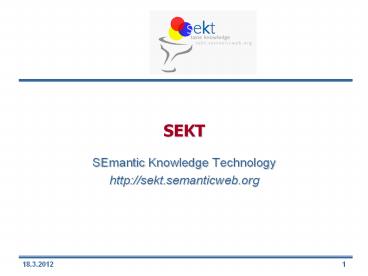SEKT - PowerPoint PPT Presentation
1 / 23
Title:
SEKT
Description:
addressing the semantic knowledge technology research agenda. 6th framework ... 'Show me the non-fiction books written by Tolkien about philology before 1940' ... – PowerPoint PPT presentation
Number of Views:307
Avg rating:3.0/5.0
Title: SEKT
1
SEKT
- SEmantic Knowledge Technology
- http//sekt.semanticweb.org
2
SEKT
- addressing the semantic knowledge technology
research agenda - 6th framework IP project
- start date 1/1/2004
- 36 months, 12.5m
- sekt.semanticweb.org
3
Key people
- Project Director John Davies, BT
- Technical Director Rudi Studer, Karlsruhe
- Project Manager Paul Warren, BT
- Project Management Board
- Marko Grobelnik, JSI
- Ralph Traphoener, Empolis
- Hamish Cunningham, Sheffield
- Juergen Angele, Ontoprise
- Atanas Kiryakov, SIRMA AI
- Jesus Contreras, iSOCO
- Tom Boesser, kea-pro
- Pompeu, UAB
- Frank van Harmelen, VUA
- Jos De Bruijn, DERI Innsbruck
4
The Goal
- To deliver next generation semantic knowledge
technology through - Foundational research
- (Semi-)automatic ontology generation and
population - Ontology management (mediation, evolution,
inferencing) - Innovative technology development
- A suite of knowledge access tools
- Open source ontology middleware platform
- Validated by 3 case studies and
benchmarking/usability activties - Supported by a methodology
5
XML is a first step
- Semantic markup
- HTML ? layout prescription
- XML ? content prescription
- Metadata
- within documents
- not across documents
- prescriptive
6
RDF, RDFS OWL
- Standards of W3C
- Descriptive
- RDF consisting of triples or sentences
- ltsubject, property, objectgt
- ltprod341, price, 54000gt, ltorg176, sells,
prod341gt - RDF RDFS used to define and populate ontologies
- OWL based on DL, more expressive, inference
capabilities, 3 dialects
7
A (simple) example
- Tolkien wrote The Hobbit
- hasWritten (http//www.famouswriters.org/tolkein/
, http//www.books.org/ISBN00001047582) - A famous writer is a kind of writer
- subclassof(FamousWriter, Writer)
- The Hobbit is a book
- type(http//www.books.org/ISBN00001047582,
- http//www.description.org/schemaBook)
8
Semantic Web KM
- Making WWW information machine processable
- annotation via ontologies metadata
- offers prospect of enhanced knowledge management
- Rank all the documents containing the word
Tolkien - Show me the non-fiction books written by Tolkien
about philology before 1940 - significant research technology challenges are
outstanding
9
Annotation is a potential bottleneck
and how do we handle legacy knowledge?
- We need automation
- semi-automatic learning of ontologies (KD)
- semi-automatic generation of metadata (HLT)
- maintaining and evolving ontologies (OMT)
- a multi-disciplinary approach
10
Major RTD challenges
- Improve automation of ontology and metadata
generation - Research and develop techniques for ontology
management and evolution - Develop highly-scalable solutions
- Research sound inferencing despite inconsistent
models - Develop semantic knowledge access tools
- Develop methodology for deployment
11
Key outcomes
- technological progress through development of
leading edge, integrated semantically-enabled KM
software tools - scientific progress through foundational research
- creation of awareness via dissemination,
training, case studies
12
Key outcomes
- building the European Research Area in KM through
collaboration with related IP and NoE projects in
this area for a coordinated impact strategy - SEKT, DIP, KnowledgeWeb SDK cluster
- sdk.semanticweb.org
- Collaboration with other projects PASCAL,
ALVIS, ECOLEAD,
13
Multidisciplinary approach
KD/HLT
Management evolution
KD/HLT
- Need to determine appropriate technology mix
- Semi-automatic
14
Human Language Technology
- Aim
- bring together the current text-based web and the
formal knowledge underlying Semantic Knowledge
Technologies - increase the adaptivity of the metadata
generation tools to evolving end-user information
needs - Language processing tools
- automating to a large degree the production of
metadata - dealing with the large scale of the Web
- supporting multiple languages
- supporting learning from unlabeled data, using KD
15
Knowledge Access
- context-aware tools for access to
semantically-annotated knowledge - search, browse, visualise, summarise, share,
infer - integrated into day-to-day business processes
- automatic knowledge delivery based on current
context (activity, location, device, interests) - support multiple end-user devices
- also support for on-the-fly metadata creation
- metadata creation as a side-effect of data
creation
16
Feedback/forward 3 case studies
helping newly-appointed judges
helping IT consultants
a corporate digital library
- Use/refinement of SEKT methodology
- Usability, business benefits and benchmarking
17
Resulting software should
- Integrate with day-to-day business processes
- automatic knowledge delivery based on current
context and activity - Support on-the-fly metadata creation
- metadata creation as a side-effect of data
creation - Have a natural and intuitive user interface
18
Dissemination Exploitation
- SDK project cluster sdk.semanticweb.org
- SEKT, DIP, KnowledgeWeb
- 1st European Semantic Web Symposium delivered
- Multiple publications, press articles
- Project poster, presentation, brochure
- Exploitation
- Systems integrator
- Several software vendors
- Sector-specific organisations
- Open source v. software products
19
Project Overview
20
The inSEKTs
Vrije Universiteit Amsterdam
Empolis
University of Sheffield
Universität Karlsruhe
BT
Ontoprise
Kea-pro
Universität Innsbruck
iSOCO
Sirma AI
Universitat Autònoma de Barcelona
Jozef Stefan Institute
21
Thank you for your timeAny questions?john.nj.d
avies_at_bt.com
22
(No Transcript)
23
Limitations of the Web today
- Machine-to-human, not machine-to-machine































